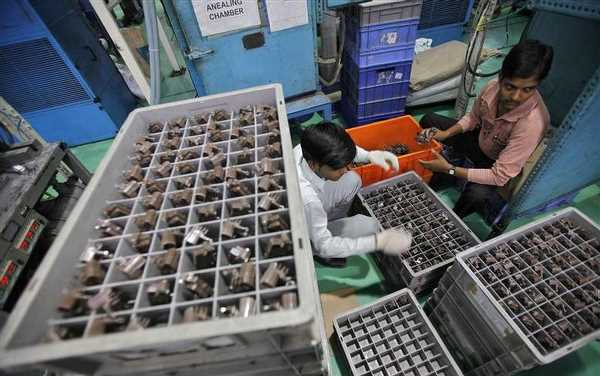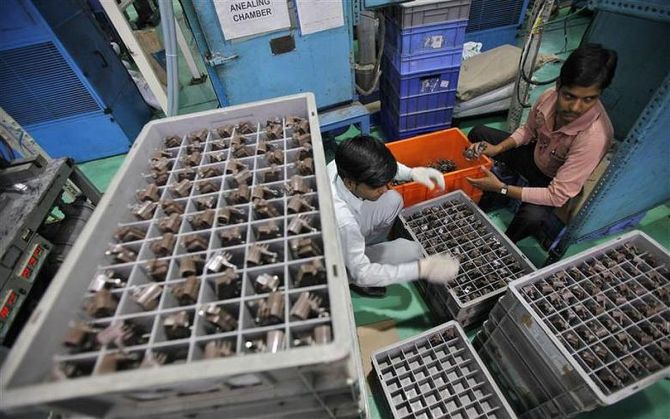Rural consumption will be crucial in the near-term for two-wheelers, while tractor sales have been healthy due to higher crop prices and adequate water reservoir levels.
Devangshu Datta reports.
The automobile sector is considered a good indicator of economic health.
It has a very long value chain, from primary materials, like metals, glass and plastic, to value-added high-end electronic components, specialised alloys, and software.
The sales and marketing functions involve high-end services including financial services, advertising, etc, and the industry also generates employment in repair and maintenance services, refuelling, etc.
Auto sales are driven by agricultural demand (tractors and two-wheelers), private consumption (passenger vehicles or PVs), logistics and general economic activity (commercial vehicles or CVs).
Sales data–wholesale despatches at dealership level, and new registrations–is tracked closely.
Covid-19 led to a collapse in sales, which are still in the process of recovery to above 2019-20 levels.
Apart from demand, supply chains were badly disrupted, especially in the area of semiconductors.
With most auto companies declaring their wholesale numbers, overall dispatches are better than expected for two-wheelers and commercial vehicles while numbers were as expected for Passenger Vehicles and tractors.
Medium and heavy CV dispatches were above estimate led by heavy pre-buying before BS6-II transition.
Overall dispatches for two wheelers, tractors and CV grew 11 per cent, 2 per cent and 11 per cent year-on-year (YoY) while PVs were flat YoY.
PV volumes remain steady though supply constraints remain.
The PV order book is healthy.
Maruti reported a one per cent decline YoY in domestic PV volumes owing to supply constraints.
The company instituted an average price hike of 0.8 per cent across models effective April 1.
The two-wheeler segment, which is very sensitive to rural/semi-urban demand, is seeing sequential pick up.
This is led by the premium segment which is primarily urban.
However, festive season demand has helped.
Two-wheeler export sales may also be picking up.
In the CV segment, the medium and heavy CV market is robust, led by strong replacement demand and pre-buying in anticipation of price hikes driven by the BS6 phase 2 transition.
Fleet operators’ sentiment has improved on hopes of pick up in infrastructure activities.
Bus sales are being driven by State Transport Corporations.
Steady freight rates have supported the profitability of CV operators.
Rising interest rates, however, could be a dampener.
Rural consumption will be crucial in the near-term for two-wheelers.
The other segment which is driven by rural demand – tractor sales have seen healthy demand due to higher crop prices and healthy water reservoir levels.
However, unseasonal rainfall and crop damage has led to inventory pile up at tractor dealers.
Some sequential improvement in two-wheeler exports may be an early sign of demand recovery.
Overall, Hero MotoCorp reported 15 per cent YoY growth, TVS Motor grew 5 per cent YoY to 307,600 units despite a 30 per cent YoY decline in exports.
CV dispatches were overall strong with 11 per cent YoY growth but Light CV demand is down.
Most OEMs have transformed their line-up to comply with upcoming Onboard diagnostics-2 norms leading to price hikes.
The sales data sparked buying across the auto and auto ancillaries sector.
The Nifty Auto index rose 1.5 per cent although it is still down 4.25 per cent in the last 30 days.
The index has gained 14.68 per cent in the last year, which is a big outperformance versus the Nifty (down 1.76 per cent).
Tata Motors (down 4.6 per cent) is the only loser among listed auto manufacturers in the past year.
Disclaimer: This article is meant for information purposes only. This article and information do not constitute a distribution, an endorsement, an investment advice, an offer to buy or sell or the solicitation of an offer to buy or sell any securities/schemes or any other financial products/investment products mentioned in this article to influence the opinion or behaviour of the investors/recipients.
Any use of the information/any investment and investment related decisions of the investors/recipients are at their sole discretion and risk. Any advice herein is made on a general basis and does not take into account the specific investment objectives of the specific person or group of persons. Opinions expressed herein are subject to change without notice.
Source: Read Full Article
-
Biden To Visit Detroit Auto Show On Day 1; To Tout EV Promoting Policies
-
Eritrea, a Small African Nation by Population, Has More Active Military Forces per Capita Than Any Other Country in the World
-
U.S. Stocks May Move Back To The Upside In Early Trading
-
FDA Approves New Therapy For Rare Blood Cancers
-
After disappointing results in Q1FY24, valuation support for LIC stock


